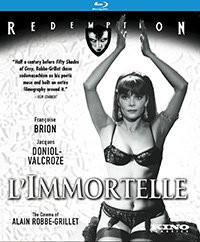 Kino’s Redemption label continues with the resurrection of New Wave provocateur Alain Robbe-Grillet’s 1963 directorial debut, L’Immortelle, (this is the third title in the planned series, and we can expect to see three more) a stylistic mish-mash of surreal flourishes, sensuality, and mysterious foreboding. Arriving two years after Robbe-Grillet penned the landmark film Last Year at Marienbad for director Alain Resnais, the first outing feels indebted to the look and style of his collaboration with Resnais, despite the realization that his framework for this film was actually developed first. Featuring the highly stylized cinematography of Maurice Berry, Robbe-Grillet transforms Istanbul into a perversely abandoned palette of architectural facades, calling into question the notion of originality and restoration, dreams and waking life.
Kino’s Redemption label continues with the resurrection of New Wave provocateur Alain Robbe-Grillet’s 1963 directorial debut, L’Immortelle, (this is the third title in the planned series, and we can expect to see three more) a stylistic mish-mash of surreal flourishes, sensuality, and mysterious foreboding. Arriving two years after Robbe-Grillet penned the landmark film Last Year at Marienbad for director Alain Resnais, the first outing feels indebted to the look and style of his collaboration with Resnais, despite the realization that his framework for this film was actually developed first. Featuring the highly stylized cinematography of Maurice Berry, Robbe-Grillet transforms Istanbul into a perversely abandoned palette of architectural facades, calling into question the notion of originality and restoration, dreams and waking life.
A Frenchman traveling in Istanbul, known only as N (Jacques Doniol-Valcroze) seems to be aimlessly experiencing the landscape when he runs into a beautiful, mysterious woman (Francoise Brion) that refers to herself first as Leila (when asked her name, she flippantly replies, “It doesn’t matter”) then starts saying it’s Lale, which is Turkish for tulip. As they begin to travel together to visit all the hot tourist spots, it begins to be evident to N that Lale knows much more about the language and the culture than she lets on. And then, she suddenly disappears, leaving N to retrace their steps throughout the city and interrogate several people they came into contact with. But to no avail—none of them can seem to remember the beautiful woman he claims he had been gallivanting around town with. But then, a mutual friend of Lale’s that N had met a party (played by none other than Robbe-Grillet’s wife), hints at the number of insidious things going on in Istanbul involving prostitution and human trafficking. Maybe their friend is involved in that? No matter, he finds her again and then she suddenly dies in a fatal car wreck, leading N to retrace his steps again, unable to decide if he caused her death or whether or not she was real in the first place.
Disc Review
As with the previously released Robbe-Grillet titles, this remastering looks remarkably pristine, and a black and white Istanbul looks superbly exotic, duly noted in the lone extra feature—a half hour interview with Robbe-Grillet pertaining specifically to this title (each Redemption release will most likely include a particular portion of this same interview). The origins of how the film came to be are almost more interesting than the film itself, such as how the filming in Istanbul originated as a scheme for a producer to try and get money out of Turkey that couldn’t be otherwise be converted. Robbe-Grillet also indicates that he doesn’t believe L’Immortelle to be his strongest work, but he discusses several scenes which he seems to be especially proud of.
Final Review
Opening with extreme close-up shots of the beautiful Brion as the screen becomes a shutter that slowly opens and closes, we’re immediately placed into the role of diminished voyeur, maddeningly given very few details about what exactly is transpiring. Lots of conversations concerning names as well as the restoration of many historical sites in Istanbul indicating that all is fake and nothing real, seems to indicate an overarching motif, but then again, not really. All stories, people, places and things are all remnants of something else, the film seems to say, the ‘immortal one’ of its title being the city itself and not the phantom female guiding confused men through it. But as visually stunning as many of the composed frames are in L’Immortelle, it seems a rather flimsy mindfuck, especially in comparison to Robbe-Grillet’s much stronger effort with Marienbad, which his debut will always be unfortunately compared to.
Instead, it serves as a rather terrifically lensed example of things to come, as Robbe-Grillet would turn in stronger (and even more playful) narrative samples later on with titles such as Trans-Europ-Express and his most noted work, 1983’s La Belle Captive. Woman as dangerous, nightmare phantoms, usually defined sexually or fetishistically as lesbian or prostitutes, figures prominently here as elsewhere in his filmography. An intriguing novelist turned filmmaker, L’Immortelle is certainly well worth checking out despite its rather difficult to grasp scenarios that never coalesce effectively into an altogether successful film.
Film: ★★½/☆☆☆☆☆
Disc: ★★★/☆☆☆☆☆


